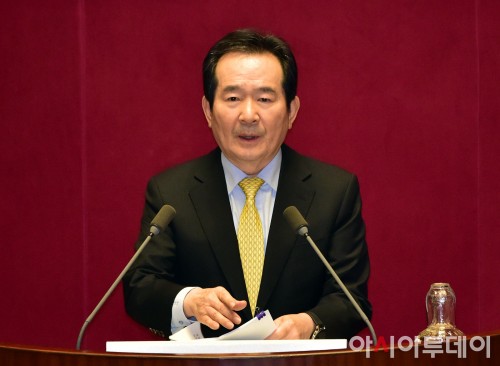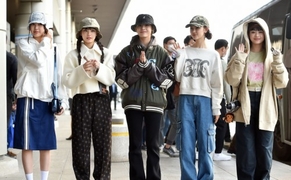 |
| Prime Minister Chung Sye-kyun delivers a parliamentary speech on the government’s extra budget bill on the new coronavirus at the National Assembly on March 5, 2020./ Source: Yonhap News |
By AsiaToday reporter Lim Yoo-jin
The government proposed an extra budget of 11.7 trillion won (US$9.9 billion) on Wednesday to help better deal with the new coronavirus and minimize economic damage from the outbreak, but some experts question about the effectiveness of the latest measure. Under the proposal, the government plans to provide gift vouchers worth 3 trillion won (US$2.5 billion) to 5 million low-incomers, elders and children over the next four months, sparking criticism that it does not fit the original purpose.
Although the extra budget is designed to promote consumption spending, most of it will be financed by issuing state bonds. This could raise concerns about the growing national debt and fiscal soundness. Moreover, many point out that the extra budget should be focused on beefing up the quarantine and healthcare system, including the provision of more medical equipment, hospital beds and facilities for the treatment of patients.
The suggested budget is the largest-ever for the fight of an epidemic in the country, more than the amount allotted to deal with the Middle East respiratory syndrome (MERS) crisis in 2015 when the government spent an additional 11.6 trillion won. The budget, if approved, should be executed in good faith to help the country win the battle against the virus, however some view it as pork barrel measure ahead of the April 15 general elections.
In fact, the budget proposal submitted to the National Assembly on Thursday shows that 2.3 trillion won will be spent to strengthen quarantine and healthcare system while nearly 3 trillion won will be spent to boost local consumption. “The budget allocated to expand the number of infectious disease specialized hospitals and negative pressure rooms stands at 80 billion won, accounting for only 0.7 percent of the total,” said Lee Jong-bae of the opposition United Future Party (UFP) and assistant administrator of the Special Committee on Budget and Accounts of the National Assembly.
“The government proposed to allocate 1.5 trillion won in the extra budget to provide 400,000 won to every household with children below the age of 7 years. They are putting more money for the general elections,” said UFP floor leader Shim Jae-chul. “It goes the same for the welfare and offering jobs for the elderly regardless of their income,” Shim said. “The public is saying that the government should focus more on the quarantine field instead of squandering money for the election,” he added.
“Instead of providing indirect support through gift vouchers, the government should provide direct support to self-employed people through employment insurance,” said Kim Ki-sik, policy director of the Korea Institute for the Future. “It is better to provide resources to the affected people rather than distributing the same amount of resources to everyone.”
Some claim that the government should actively utilize local governments’ disaster management funds and disaster relief funds in order to minimize the amount of extra budget. “There are disaster relief funds and disaster relief funds available in response to the coronavirus outbreak,” said Park Jong-hyun, a safety communication officer at the Ministry of the Interior and Safety. “Some points out those local governments are not actively using such funds to deal with the new coronavirus. We are monitoring everyday how local governments are utilizing the two funds to deal with the virus,” Park said.
#extra budget #coronavirus #Covid-19
Copyright by Asiatoday
Most Read
-
1
-
2
-
3
-
4
-
5
-
6
-
7





















